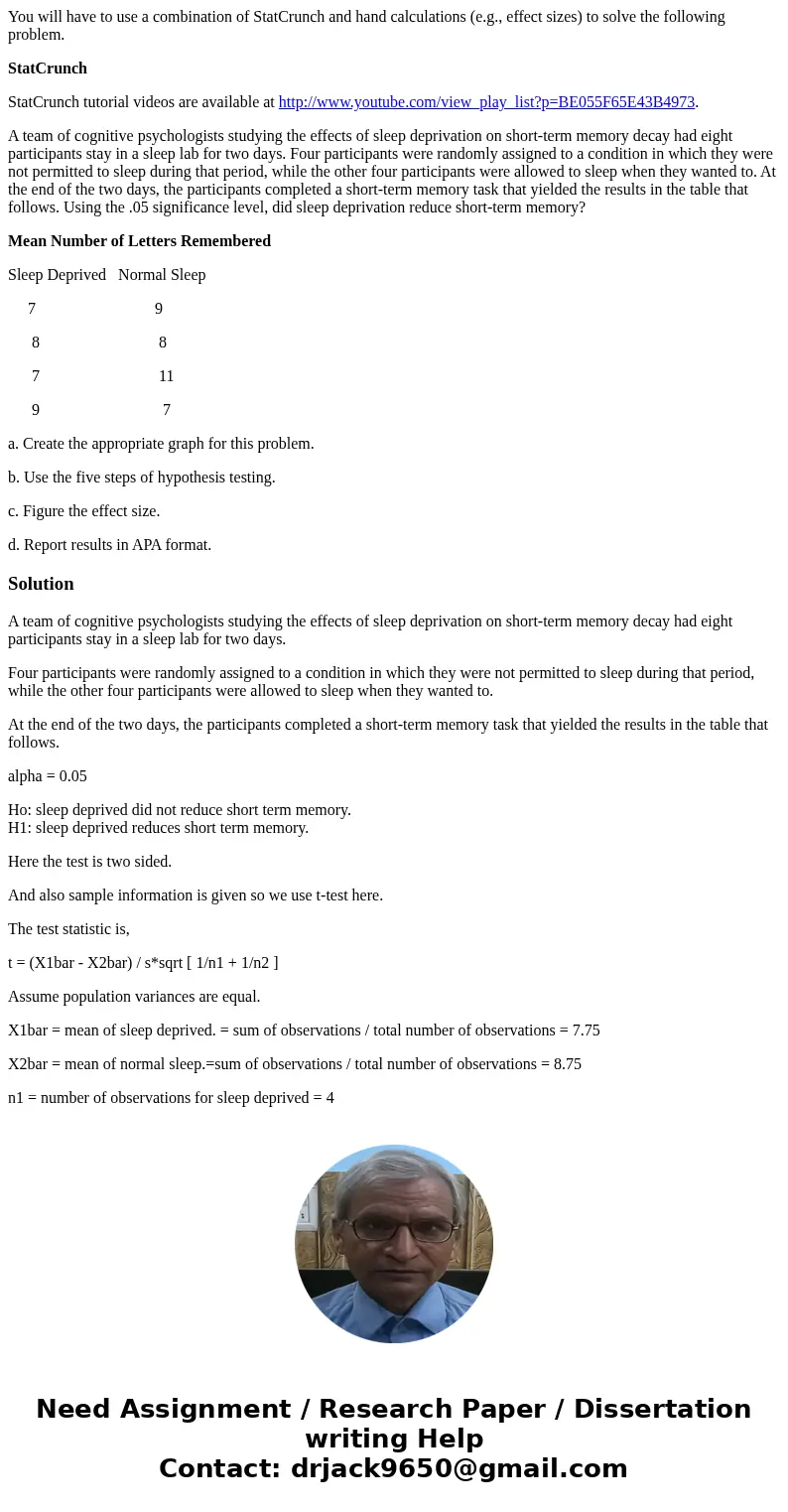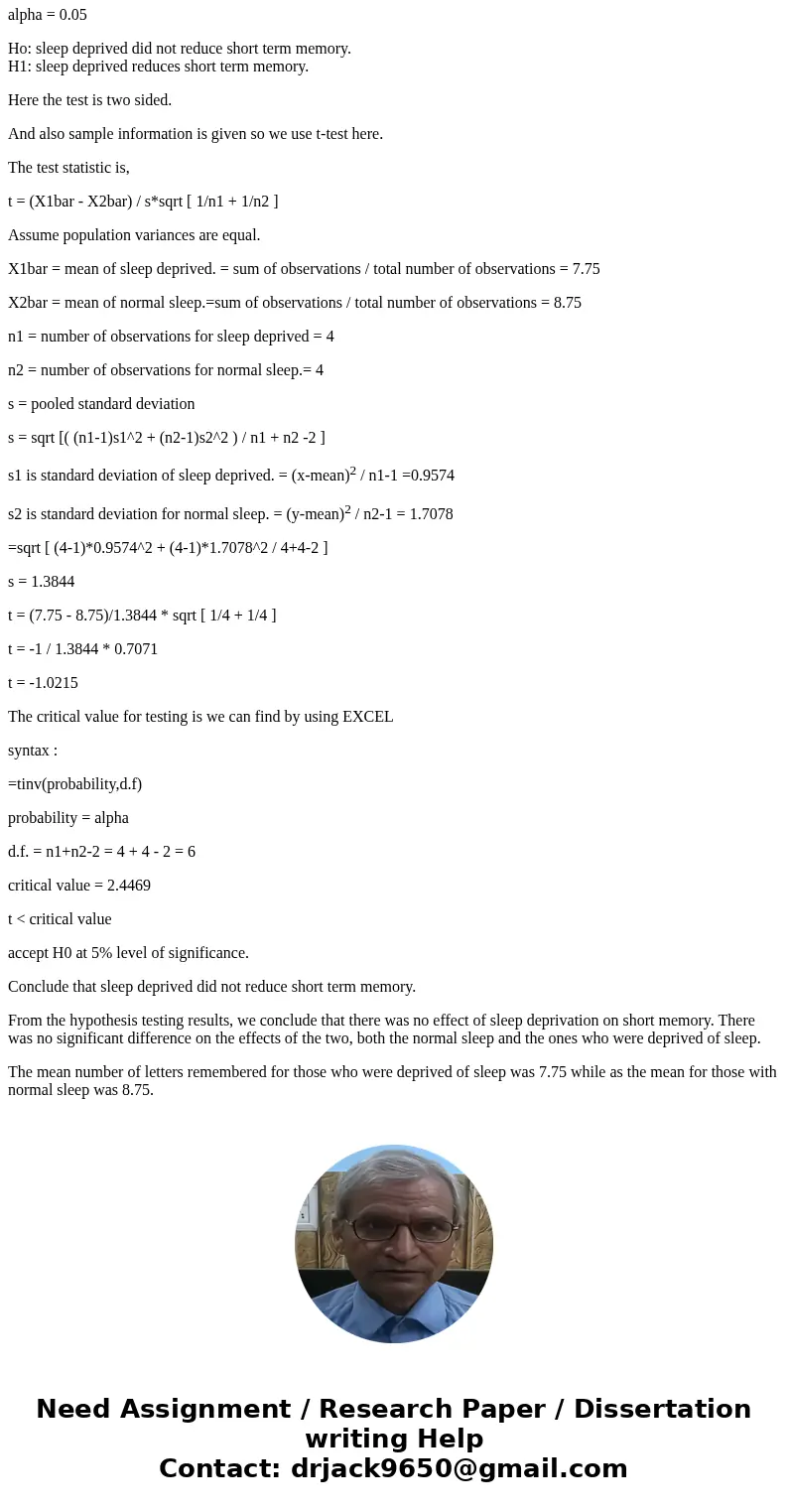You will have to use a combination of StatCrunch and hand ca
You will have to use a combination of StatCrunch and hand calculations (e.g., effect sizes) to solve the following problem.
StatCrunch
StatCrunch tutorial videos are available at http://www.youtube.com/view_play_list?p=BE055F65E43B4973.
A team of cognitive psychologists studying the effects of sleep deprivation on short-term memory decay had eight participants stay in a sleep lab for two days. Four participants were randomly assigned to a condition in which they were not permitted to sleep during that period, while the other four participants were allowed to sleep when they wanted to. At the end of the two days, the participants completed a short-term memory task that yielded the results in the table that follows. Using the .05 significance level, did sleep deprivation reduce short-term memory?
Mean Number of Letters Remembered
Sleep Deprived Normal Sleep
7 9
8 8
7 11
9 7
a. Create the appropriate graph for this problem.
b. Use the five steps of hypothesis testing.
c. Figure the effect size.
d. Report results in APA format.
Solution
A team of cognitive psychologists studying the effects of sleep deprivation on short-term memory decay had eight participants stay in a sleep lab for two days.
Four participants were randomly assigned to a condition in which they were not permitted to sleep during that period, while the other four participants were allowed to sleep when they wanted to.
At the end of the two days, the participants completed a short-term memory task that yielded the results in the table that follows.
alpha = 0.05
Ho: sleep deprived did not reduce short term memory.
H1: sleep deprived reduces short term memory.
Here the test is two sided.
And also sample information is given so we use t-test here.
The test statistic is,
t = (X1bar - X2bar) / s*sqrt [ 1/n1 + 1/n2 ]
Assume population variances are equal.
X1bar = mean of sleep deprived. = sum of observations / total number of observations = 7.75
X2bar = mean of normal sleep.=sum of observations / total number of observations = 8.75
n1 = number of observations for sleep deprived = 4
n2 = number of observations for normal sleep.= 4
s = pooled standard deviation
s = sqrt [( (n1-1)s1^2 + (n2-1)s2^2 ) / n1 + n2 -2 ]
s1 is standard deviation of sleep deprived. = (x-mean)2 / n1-1 =0.9574
s2 is standard deviation for normal sleep. = (y-mean)2 / n2-1 = 1.7078
=sqrt [ (4-1)*0.9574^2 + (4-1)*1.7078^2 / 4+4-2 ]
s = 1.3844
t = (7.75 - 8.75)/1.3844 * sqrt [ 1/4 + 1/4 ]
t = -1 / 1.3844 * 0.7071
t = -1.0215
The critical value for testing is we can find by using EXCEL
syntax :
=tinv(probability,d.f)
probability = alpha
d.f. = n1+n2-2 = 4 + 4 - 2 = 6
critical value = 2.4469
t < critical value
accept H0 at 5% level of significance.
Conclude that sleep deprived did not reduce short term memory.
From the hypothesis testing results, we conclude that there was no effect of sleep deprivation on short memory. There was no significant difference on the effects of the two, both the normal sleep and the ones who were deprived of sleep.
The mean number of letters remembered for those who were deprived of sleep was 7.75 while as the mean for those with normal sleep was 8.75.


 Homework Sourse
Homework Sourse